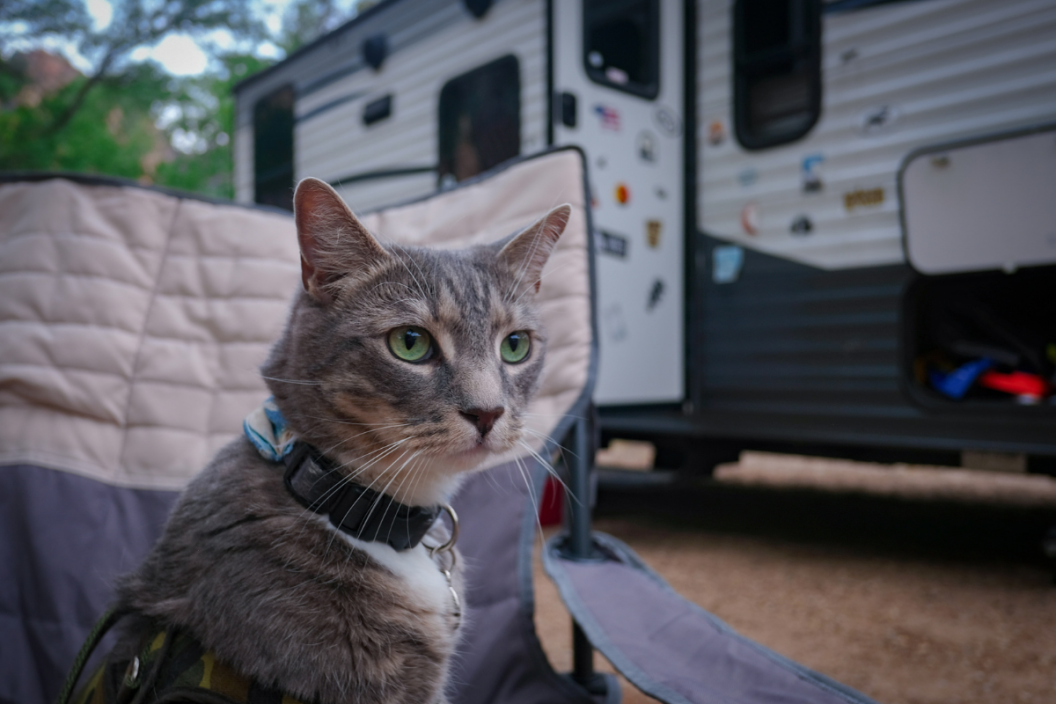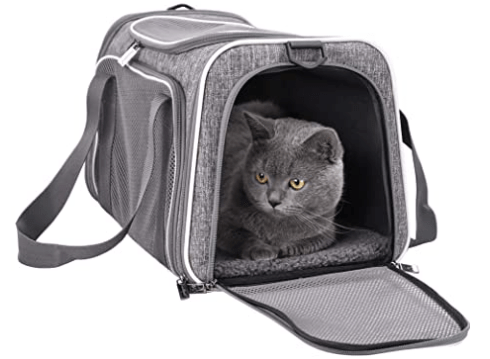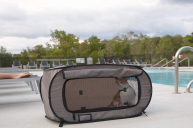One of the biggest concerns travelers have is where to leave their pets while they're gone. Cats can be especially difficult since they don't do as well when left at a kennel. Full time RVers need not worry though. If you'd love to visit national parks, caves, lakes, and other natural wonders without worrying about your pets, RV travel allows you to simply take your feline friends on a road trip with you for some easy RV living.
Here are our tips for RVing with cats.
1. RVing With Cats With Confidence: Ease Their Anxiety
https://www.instagram.com/p/BvPf_usHD1v/?utm_source=ig_web_copy_link
If your cat has anxiety make sure you prepare them for the trip before hitting the road. An RV adventure for you might turn into a nightmare for them without the proper steps. Let anxious cats explore and familiarize themselves with their new environment prior to the trip. Set up everything exactly as you plan to have it on the trip. Food and litter boxes should be in easily accessible spots, and a familiar cat carrier with a blanket can provide warmth and a sense of home in their new living space.
If necessary you can purchase a calming medicine like Feliway on Amazon to help ease their anxiety. Feliway is a natural reproduction of a hormone cats secrete when calm, making it the perfect natural remedy for nervous cats adjusting to RV life. Pick up some Feliway before hitting the road.
Make sure to keep the temperature in your motorhome comfortable for your cat, even when you're away. Remember that RVing can involve plenty of time where you're not in the RV, and you'll want to keep your cat comfortable while you're gone or even outside in an RV park.
2. Avoiding Litter Box Incidents and Motion Sickness
https://www.instagram.com/p/CCr0pErJWSr/?utm_source=ig_web_copy_link
Both indoor cats and outdoor cats can be prone to motion sickness. If you have a cat with these issues, make sure you speak to your vet about getting proper medication before heading out for RV life. Sometimes natural remedies like fresh air can help soothe them on RV trips as well. If you're just starting out, limit your travel days so your feline friend has time to adjust to full time RV life. You can also avoid cat food right before hitting the road in your camper. Just like humans, fresh air, fresh water, a clean litter box, and a calm living space can help ease any discomfort while on the road.
No one wants to deal with any unnecessary cleanup. Like at home, keeping a cat's litter box calm, quiet, and clean can help you avoid any litter box related incidents. Litter box cleanup should be frequent and habitual. Keep several poop scoops on hand so cleanup is easy and convenient while on the road. Marking and territorial behavior can be alleviated by having enough litter boxes to go around. Experts usually recommend one litter box per cat, plus an additional one. While most campers can't accommodate this many litter boxes, smart motorhome owners would do well to try and squeeze at least two into their travel trailer. Feliway can also help with marking and litter box issues, so be sure to keep some on hand.
3. Adjusting To RV Life
https://www.instagram.com/p/BtRg6P1ncR3/?utm_source=ig_web_copy_link
RELATED: Traveling with Dogs: 11 Bike Baskets and Bike Trailers for Dogs
Like at home, cats in a motorhome will need entertainment. Scratching posts and favorite toys can help alleviate the issues of being in a small space while full-time RVing. Don't forget to bring lots of toys, and try to tire them out at night when you aren't on the road, so they'll sleep during the day. Leave a shade up if possible so the cats can look outside during the night or early morning. Your motorhome should feel like a safe living environment for your cats, and having their familiar toys, scratching posts, and cat carriers will help make that a reality.
4. Use Carriers While RVing With Cats
Bring them out to your motor home in their cat carrier, and always keep their cat carriers handy in case of an emergency. Cats also love familiarity, and a familiar cat carrier can help them adjust to life on the road. If you have a travel trailer or fifth wheel, you'll also need your carrier to transport your cat in the car. Remember to secure any occupied cat carriers in the backseat with a seatbelt to keep your furry friend safe. A cat harness can also help your feline friend adjust to life on the road safely, if needed. Remember that even RV cats need to be leash trained before hitting the road to avoid tantrums and other behavioral issues.
5. Explore RV Living Safely With A Catio
If your RV cat is on the adventurous side, you can even set up a catio and connect it to your RV with a cat door. Cat tents like these help your feline friend explore the environment in comfort and safety, and are a big hit for both indoor cats and outdoor cats. Popup catios can be purchased on Amazon or at your local pet store, and some cat carriers even offer attached catios on the side. RVing typically involves quite a lot of enjoying the great outdoors, and a catio can allow your cat to safely participate without giving them the freedom to roam into unsafe areas. Screen doors can also help your cat be part of RV life without compromising their safety.
6. Bring their Vaccination Records
Vaccination records are essential when traveling with small dogs, cats, or any animal. Many countries require up to date vaccination records for border crossing, and being stranded with no ability to continue your road trip can really put a damper on any good RVer's trip. Be sure to pack recent vaccination records so you won't run into any issues if you end up at the vet or border crossing.
Any favorite tips for RVing with cats? Share your pics and tips on our Wide Open Roads Facebook !






